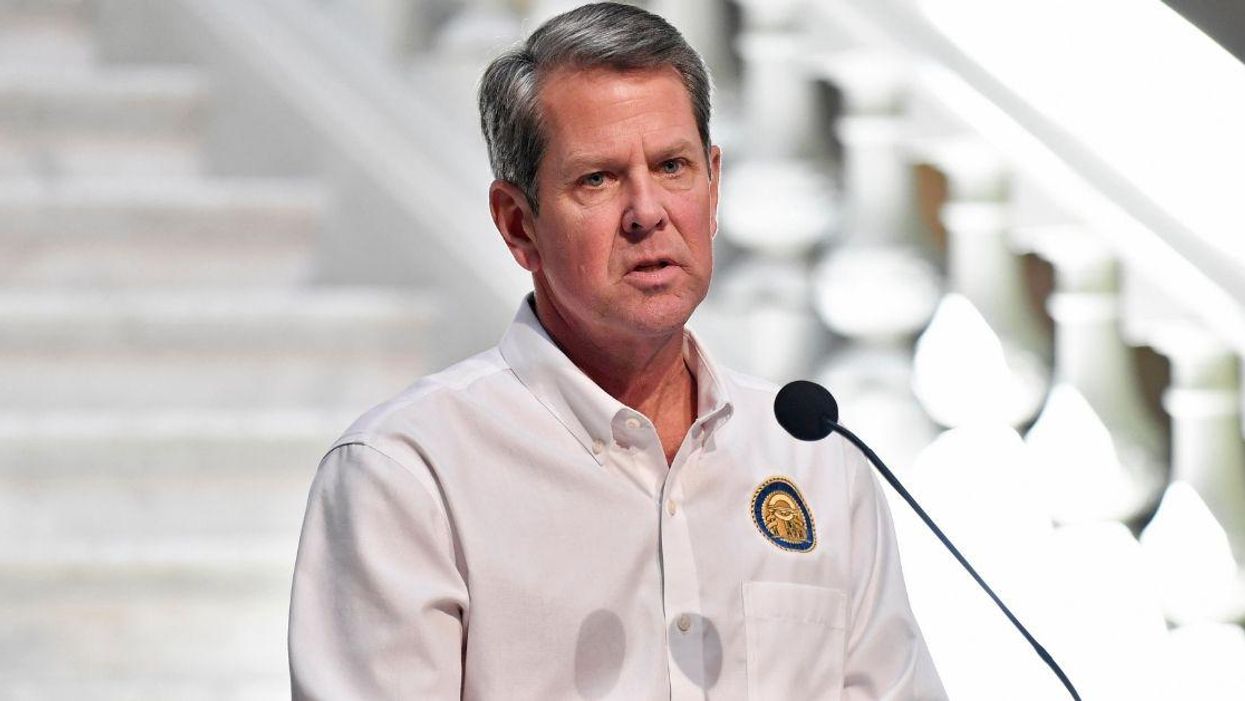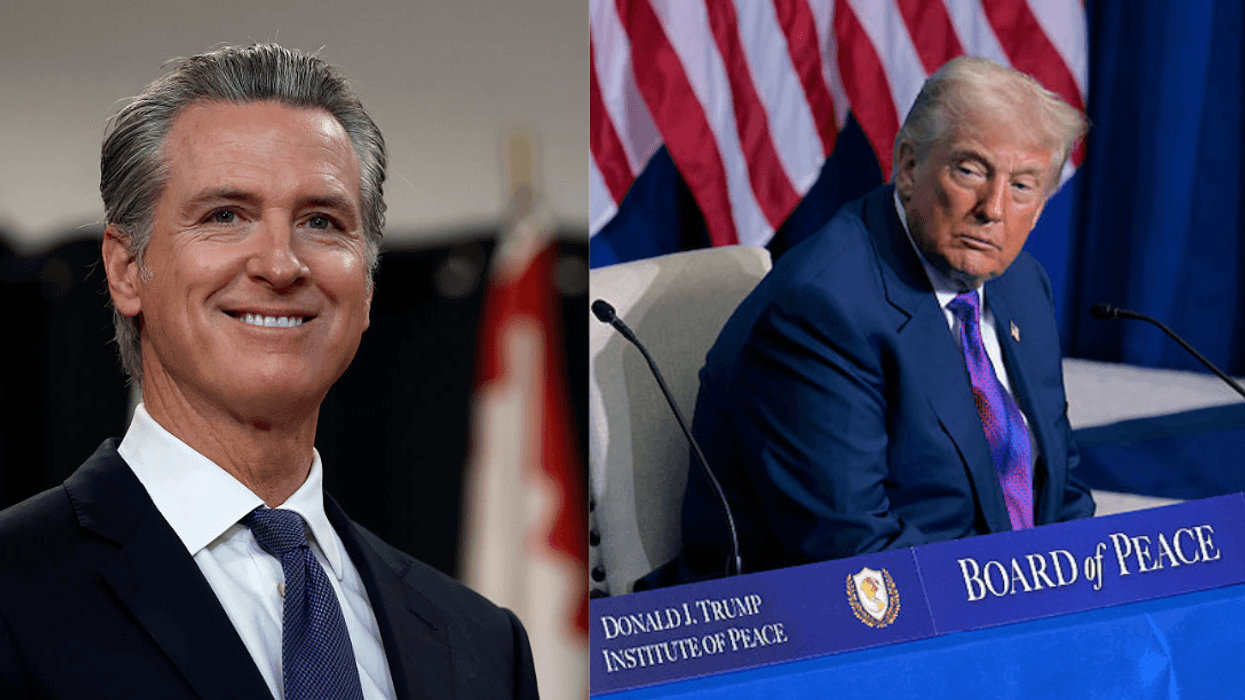The draconian voter restriction bill in the state of Georgia, drafted following a 2020 election in which Black and minority voters turned the state blue for the first time in nearly 30 years, is now law in the state.
Republican Georgia Governor Brian Kemp signed the controversial bill Thursday, which even bans handing out bottles of water to voters waiting in lines for hours. And for many people angered by it, a viral photo of the signing said it all.
A group of all White men, signing voter suppression legislation—beneath a painting of a plantation, no less-in one of the Blackest states in the union.
The bill constitutes a sweeping overhaul of voting laws making it more difficult to vote in the state, with restrictions disproportionately affecting minority, young, poor and disabled voters.
The bill restricts access to absentee voting, ballot dropboxes and provisional ballots. It also requires an ID, such as a driver's license, in order to vote. It curtails early voting periods for some elections, among other rules and restrictions.
The new bill also gives sweeping powers to the State Election Board during elections to supersede both the Secretary of State and county-level authorities and take over elections operations, including vote tallying, as it sees fit.
Opponents have dubbed the bill "Jim Crow 2.0" because of its clear, if unspoken, targeting of Black and minority voters, who vote most often for Democratic candidates and were the linchpin of Democratic President Joe Biden's 2020 victory in the state.
But Republicans insist these changes are needed to increase election security and address suspicions about fraud and irregularities in the 2020 election, for which there is no evidence.
In a live-streamed speech, Kemp said of the legislation:
"With Senate Bill 202, Georgia will take another step toward ensuring our elections are secure, accessible and fair. Ensuring the integrity of the ballot box isn't partisan, it's about protecting the very foundation of who we are as Georgians and Americans."
But Georgia's Republican elections officials agreed at the time concerns about the 2020 election were unfounded. Republican Secretary of State Brad Raffensberger and other officials even said as much to former President Donald Trump in a now infamous phone call in which he asked officials to "find 11,780 votes."
Many feel the bill is just the latest step in a years-long assault on free and fair elections by Governor Kemp, who as Georgia's Secretary of State purged millions of mostly Black and minority voters from the state's voter rolls and closed hundreds of polling places in advance of his narrow 55,000-vote gubernatorial victory against his opponent, Black voting rights activist Stacey Abrams.
Everything taken together, the photo of Kemp signing the bill couldn't be a more perfect symbol and many on Twitter were outraged.
In response to the new bill, a raft of federal lawsuits were filed by voter rights organizations including the New Georgia Project, founded by Stacey Abrams.








 The Benny Show
The Benny Show





 @neilforreal/Bluesky
@neilforreal/Bluesky @savannahcat/Bluesky
@savannahcat/Bluesky @qadishtujessica.inanna.app
@qadishtujessica.inanna.app @v-ron/Bluesky
@v-ron/Bluesky @nelnelnellie/Bluesky
@nelnelnellie/Bluesky @beatlenumber9/Bluesky
@beatlenumber9/Bluesky @pinkzombierose/Bluesky
@pinkzombierose/Bluesky
 @theunobsolete/TikTok
@theunobsolete/TikTok @theunobsolete/TikTok
@theunobsolete/TikTok @theunobsolete/TikTok
@theunobsolete/TikTok @theunobsolete/TikTok
@theunobsolete/TikTok @theunobsolete/TikTok
@theunobsolete/TikTok @theunobsolete/TikTok
@theunobsolete/TikTok @theunobsolete/TikTok
@theunobsolete/TikTok @theunobsolete/TikTok
@theunobsolete/TikTok @theunobsolete/TikTok
@theunobsolete/TikTok @theunobsolete/TikTok
@theunobsolete/TikTok @theunobsolete/TikTok
@theunobsolete/TikTok @theunobsolete/TikTok
@theunobsolete/TikTok @theunobsolete/TikTok
@theunobsolete/TikTok @theunobsolete/TikTok
@theunobsolete/TikTok @theunobsolete/TikTok
@theunobsolete/TikTok @theunobsolete/TikTok
@theunobsolete/TikTok @theunobsolete/TikTok
@theunobsolete/TikTok
 @laysuperstar/TikTok
@laysuperstar/TikTok @laysuperstar/TikTok
@laysuperstar/TikTok @laysuperstar/TikTok
@laysuperstar/TikTok @laysuperstar/TikTok
@laysuperstar/TikTok @laysuperstar/TikTok
@laysuperstar/TikTok @laysuperstar/TikTok
@laysuperstar/TikTok @laysuperstar/TikTok
@laysuperstar/TikTok @laysuperstar/TikTok
@laysuperstar/TikTok @laysuperstar/TikTok
@laysuperstar/TikTok @laysuperstar/TikTok
@laysuperstar/TikTok @laysuperstar/TikTok
@laysuperstar/TikTok @laysuperstar/TikTok
@laysuperstar/TikTok @laysuperstar/TikTok
@laysuperstar/TikTok @laysuperstar/TikTok
@laysuperstar/TikTok @laysuperstar/TikTok
@laysuperstar/TikTok